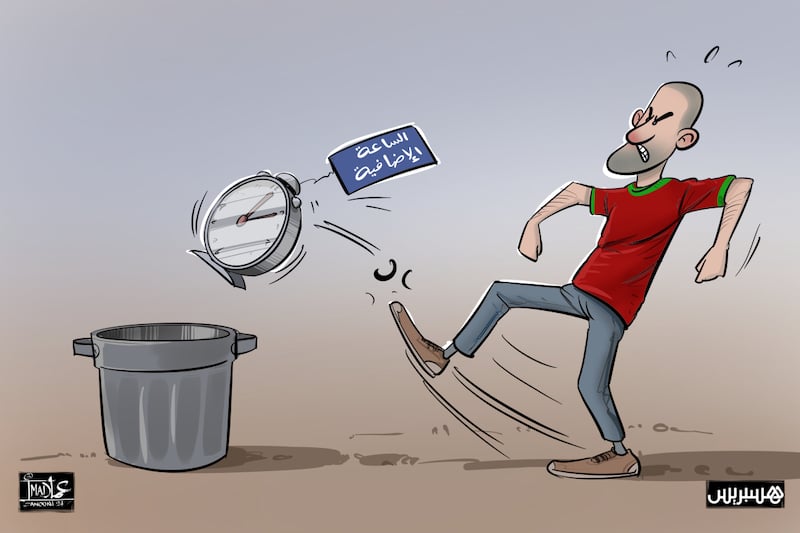أكدت أصوات مدنية وحقوقية مغربية أن “السياق الراهن، مع اقتراب فصل الخريف وما يرافقه من ظروف مناخية صعبة، إلى جانب الاستعدادات للدخول المدرسي، يجعل من التراجع عن اعتماد التوقيت الصيفي طيلة السنة خيارًا ملحًّا ومستعجلاً”، داعية إلى “مراجعة القرار الحكومي القاضي بالإبقاء على هذا التوقيت، بالنظر إلى ما يُسببه من آثار سلبية على الصحة النفسية”.
ودعت الجهات المدنية ذاتها الجهاز التنفيذي إلى إجراء “تقييم موضوعي وشفاف لهذا القرار، بعيدا عن أي ضغوط خارجية أو اعتبارات ضيقة لا تراعي المصلحة العامة”، مشددة على أن “الحاجة باتت ملحة لفتح نقاش عمومي واسع يُعيد ترتيب الأولويات، ويضع صحة المواطن وجودته الحياتية في صدارة الاهتمامات، خاصة في ظل غياب دراسات رسمية تُبرر الاستمرار في اعتماد هذا التوقيت”.
إلهام بلفليحي، الكاتبة العامة للشبكة المغربية للتحالف المدني للشباب، قالت إن “تغيير الساعة القانونية واعتماد التوقيت الصيفي بشكل دائم له أثر سلبي بالغ على نفسية المواطنين وجودة أدائهم، خاصةً خلال فصل الشتاء، عندما يغلب الظلام على ساعات الصباح الأولى”، معتبرة أن “هذا التوقيت يخلق اضطرابًا يوميًا في نمط حياة المواطنين”.
وأضافت بلفليحي، خلال تصريحها لجريدة هسبريس، أن “المواكبة التي تم إنجازها عقب اعتماد هذا التوقيت لم تُظهر أي فوائد ملموسة على صعيد جودة الأداء المهني أو التحصيل الدراسي”، بل على العكس تؤكد أغلب المؤشرات أن “هناك تداعيات نفسية واجتماعية خطيرة تطال فئات متعددة، في مقدمتها الأطفال، ما يدعو إلى مراجعة شاملة لهذا القرار الذي لا يجد سنداً علمياً قوياً أو مبررات حقيقية تقنع الرأي العام بجدواه”.
وأشارت المتحدثة إلى أن “المجتمع المدني طالما نادى بضرورة فتح نقاش عمومي جاد ومسؤول حول جدوى هذا التوقيت، بعيداً عن التبريرات الجاهزة التي تروّج لفكرة أنه يخدم الاقتصاد الوطني”، وتساءلت في هذا السياق: “ما الذي تحقق فعلاً؟ أين هي الدراسات الحكومية الرسمية التي تُظهر بوضوح المكاسب المتوقعة أو المحققة؟”، وزادت: “إن انتفاء هذه المعطيات يعزز الشعور بأن القرار ارتجالي ولا يراعي مصلحة المواطنين”.
وشددت الفاعلة المدنية ذاتها على أن “الحكومة مطالبة اليوم بتقديم أجوبة صريحة عن خلفيات هذا القرار، خاصة في ظل المعطيات المتوفرة التي تؤكد أن اعتماد التوقيت الصيفي لا يُراعي لا مصلحة التلميذ، ولا مصلحة الموظف، ولا حتى جودة الأداء داخل المؤسسات”، موردة أن “القرار يبدو أقرب إلى إجراء إداري فرضته جهات معينة دون مراعاة الكلفة النفسية والاجتماعية التي يتحملها المواطن المغربي يوميًا”.
وذكرت المصرحة أن “مصلحة الطفل تظل أسمى من كل الاعتبارات، وبذلك تتعين إعادة النظر جذريًا في هذا التوقيت، إنصافًا للمتعلمين وحفاظًا على الصحة النفسية والجسدية للمواطنين”، مردفة: “المؤشرات واضحة، والضرر بات ملموسًا، ما يجعل العودة إلى الساعة الطبيعية ضرورة ملحة، وليس مجرد مطلب ظرفي”.
عبد الكبير جعفري، فاعل حقوقي ومدني، قال إن “الإبقاء على الساعة الإضافية طيلة السنة يشكل اعتداءً صريحاً على الحقوق الأساسية للمواطنين، وفي مقدمتها الحق في الراحة، وفي التوازن الزمني والمعيشي”، مضيفا أن “الاشتغال بهذا التوقيت الصيفي فقط كما كان في السابق لا إشكال فيه، لكن فرضه طيلة السنة دون أي استشارة عمومية أو نقاش مجتمعي يعكس توجهاً غير ديمقراطي في تدبير شأن زمني يمس الحياة اليومية للملايين”.
وأكد جعفري، وهو يصرّح لجريدة هسبريس، أن “التوقيت الصيفي الدائم يُخلّ بالنظام البيولوجي للإنسان، ويتسبب في اضطرابات نفسية وصحية خطيرة، ولاسيما لدى الأطفال والتلاميذ الذين يُجبرون على التنقل في أوقات مبكرة تحت جنح الظلام، ما يعرضهم للخطر، ويؤثر على مردودهم الدراسي واستقرارهم النفسي”، داعيا الدولة إلى “تقييم هذا الإجراء في ضوء أثره المباشر على كرامة المواطن، لتسهيل التراجع عنه”.
وأضاف المتحدث ذاته أن “فرض هذا التوقيت لا يحقق أي مصلحة عامة ملموسة، بل يكرّس الإرباك الاجتماعي والمهني، ويشوّش على حق المواطنين في تنظيم يومهم بما يتماشى مع السياق الطبيعي والجغرافي للبلاد”، مشددا على أن “اعتماد توقيت لا يراعي الخصوصيات المجتمعية والثقافية يعد حيفًا ممنهجا تمارسه الحكومة، ويمس بالحق في بيئة زمنية ملائمة بالنسبة لعموم المغاربة”.
وفي سياق اقتراب فصل الخريف والدخول المدرسي طالب الفاعل المدني عينه بـ”توقيف العمل بهذا التوقيت المفروض، والدعوة إلى حوار وطني شفاف تشارك فيه كافة الفئات المعنية، من أجل بلورة قرار عادل، ينسجم مع مصلحة المواطنين، ويحترم حقهم في المشاركة في القرارات التي تؤثر على حياتهم اليومية،” داعياً الحكومة إلى “التراجع عن منطق الاستفراد والإنصات لصوت الناس”.













Recommended for you
طالب الرفاعى يؤرخ لتراث الفن الكويتى فى "دوخى.. تقاسيم الصَبا"
مدينة المعارض تنجز نحو 80% من استعداداتها لانطلاق معرض دمشق الدولي
تقديم طلبات القبول الموحد الثلاثاء و640 طالبا سيتم قبولهم في الطب
البريد المصري: لدينا أكثر من 10 ملايين عميل في حساب التوفير.. ونوفر عوائد يومية وشهرية وسنوية
سمو الشيخ عيسى بن سلمان بن حمد آل خليفة يستقبل سفير الولايات المتحدة الأمريكية لدى مملكة البحرين
الجغبير: القطاع الصناعي يقود النمو الاقتصادي